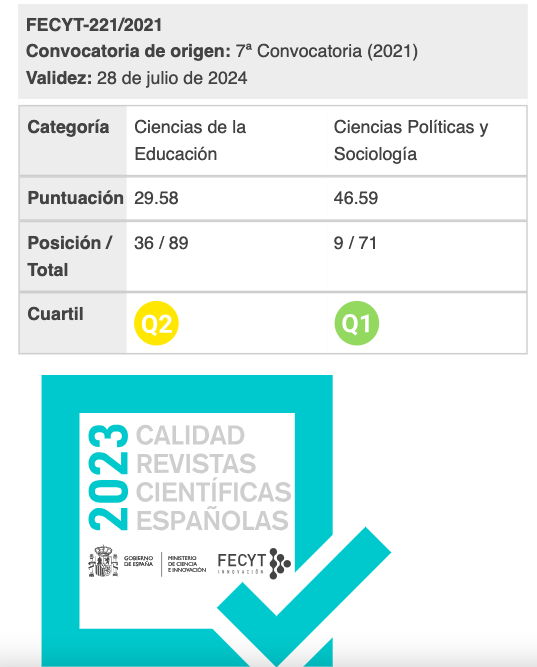Family practices in the construction of creative professionals. A biographical perspective
Downloads
Abstract
The aim of this paper is to analyse the relationships between family configurations and creative occupations. For this purpose, a biographical perspective was taken through the reconstruction of the life histories of sixteen creative professionals in Spain. We have followed two lines of approach, namely Florida’s classification of occupations (2002), which distinguishes between a creative class and a super-creative core, and Lahire’s conception of family configuration (1995). The main results reveal the importance of practices that are carried out on a daily basis by the family network (both internally and externally): reading and writing, cultural consumption (theatre, music, exhibitions, etc.), types of leisure (travelling) and forms of authority that lead the way to self-control and domestic family order. We have shown with this study the importance of the transmission of family culture in the construction of people who have creative occupations and the relationship that exists between the family educational capital and the educational level attained by the offspring.Downloads
References
Alonso, L.E. & Fernández, C. J. (2013). Los discursos del presente. Madrid: Siglo XXI.
Google Scholar CrossrefAmabile, T. M., (1983). The social psychology of creativity. New York: Springer-Verlag.
Google Scholar CrossrefArieti, S., (1976). Creativity. The magic synthesis. New York: Basic Books
Google Scholar CrossrefBaez, J.M., Bergua, J.A., & Pac, D. (2014) “The Creative Class and the Creative economy in Spain”, Creativity Research Journal, 26(4), 418-426.
Google Scholar CrossrefBergua, J. A., Pac, D., Báez, J.M., & Serrano, C. (2014). “Creatividad y Clases Creativas. Una aproximación a la realidad española”, Revista Internacional de Sociología (waiting to be published)
Google Scholar CrossrefBoix, R., Lazzeretti, L., Capone, F., de Propris. L., & Sánchez, D. (2012). “The geography of creative industries in Europe: A comparison analysis in Italy, France, the United Kingdom and Spain” in Lazzeretti, L. (ed.). Creative industries and innovation in Europe: Concepts, Measures and Comparative Case Studies, Routledge
Google Scholar CrossrefBourdieu, P. (2000). Poder, derecho y clases sociales. Bilbao: Desclée de Brouwer.
Google Scholar CrossrefCarbonero, M. A. (1997). Las estrategias laborales de las familias en España. Madrid: CES.
Google Scholar CrossrefColeman, J. S. (2011). Fundamentos de teoría social. Madrid: CIS
Google Scholar CrossrefCsikszentmihály, M. (1990). “The Domanin of Creativity”, in Runco, A., & Albert, R. S. (1990). Theories of creativity. California: Sage Publications
Google Scholar CrossrefEchevarría, J. (2005). La movilidad social: teorías, conceptos y aspectos metodológicos. In J.J González y M. Requena (ed.) Tres décadas de cambio social en España. Madrid: Alianza.
Google Scholar CrossrefFarrel, B., VandeVusse, A. & Ocobock, A. (2012). “Family change and the state of family sociology”. Current Sociology, 60(3), 283-301.
Google Scholar CrossrefFeinstein, L., Duckworth, K., & Sabates, R. (2008). Education and the Family. Passing success across the generations. Abingdon: Routledge
Google Scholar CrossrefFlorida, R. (2002). The rise of the creative class. New York: Basic Books
Google Scholar CrossrefFlorida, R., & Tinagli, I. (2004). Europe in the Creative Age, Carnegie Mellon Software Industry Center, Alfred P. Sloan Foundation and Demos.
Google Scholar CrossrefFlorida, R. (2010): La clase creativa. La transformación de la cultura del trabajo y del ocio en el siglo XXI. Barcelona: Paidós.
Google Scholar CrossrefFlorida, R. (2011). El gran reset. Barcelona: Paidós.
Google Scholar CrossrefGarcía Gracia, E. (2003). El sistema de enseñanza como construcción histórica y social. In F. F. Palomares (ed.). Sociología de la educación (87-116). Madrid: Pearson Prentice Hall. Goleman, D., Kaufman, P., & Ray, M. (2009). El espíritu creativo. Barcelona: ZETA
Google Scholar CrossrefJoas, H. (2005). The creativity of action. Cambridge: Polity Press.
Google Scholar CrossrefKoestler, A. (1989). The act of creation. England: Arkana.
Google Scholar CrossrefLahire, B. (1995). Tableaux des families. Heurs et malheurs scolaires en milieu populaires. Paris: Gallimard.
Google Scholar CrossrefLahire, B. (2013). Dans les plis singuliers du social. Individus, institutions, sociolisations. Paris: La Décourverte
Google Scholar CrossrefMartín Criado, E. (2000). Familia de clase obrera y escuela. Donostia, Iralka.
Google Scholar CrossrefMendez, R., Michelini, J. J., Prada, J. & Tebar, J. (2012): “Economía creativa y desarrollo urbano en España: una aproximación a sus lógicas espaciales”. EURE, 38(113), 5-32.
Google Scholar CrossrefMilgram, R. M. (1990). Creativity: An Idea Whose Time Has Come and Gone? in Runco, M. A., & Albert, R. S. (ed.). Theories of creativity. California: Sage Publications
Google Scholar CrossrefNavarro, C.J. & Mateos, C. (2010). “La clase creativa en los municipios españoles. Propuesta de medición y análisis descriptivo”. DT 04/10. Sevilla, Centro de Sociología y Políticas Locales, Universidad Pablo de Olavide.
Google Scholar CrossrefNavarro Ardoy, L. (2006). Modelos ideales de familia en la sociedad española, Revista Internacional de Sociología, nº 43, January-April, 119-138.
Google Scholar CrossrefRickards, T. (1988). Creativity at work. Aldershot: Gower publishing company
Google Scholar CrossrefRunco, M. A., & Albert, R. S. (1990). Theories of creativity. California: Sage Publications
Google Scholar CrossrefSánchez Moral, S. & Arellano, A. (2012). “El empleo en la economía del conocimiento en España: características socio-profesionales y patrones de distribución territorial”. Scripta. Nova Revista Electrónica de Geografía y Ciencias Sociales, vol. XVI, 399.
Google Scholar CrossrefSawyer, R. K. (2011). Explaining Creativity: The Science of Human Innovation. New York: Oxford University Press.
Google Scholar CrossrefTrinidad, A., Carrero, V. & Soriano, R.M. (2006). Teoría fundamentada La construcción de la teoría a través del análisis interpretacional. Madrid: Centro de Investigaciones Sociológicas.
Google Scholar CrossrefWall, K. & Gouveia, R. (2014). “Changing meanings of family in personal relationships”. Current Sociology 62(3), 352-373
Google Scholar CrossrefWinnicott, D. W. (1971). Playing and reality. London: Tavistock Publications.
Google Scholar CrossrefDownloads
Published
Almetric
Dimensions
How to Cite
Issue
Section
License
All articles are published under Creative Commons copyright (CC BY). Authors hold the copyright and retain publishing rights without restrictions, but authors allow anyone to download, reuse, reprint, modify, distribute, and/or copy articles as the original source is cited.















